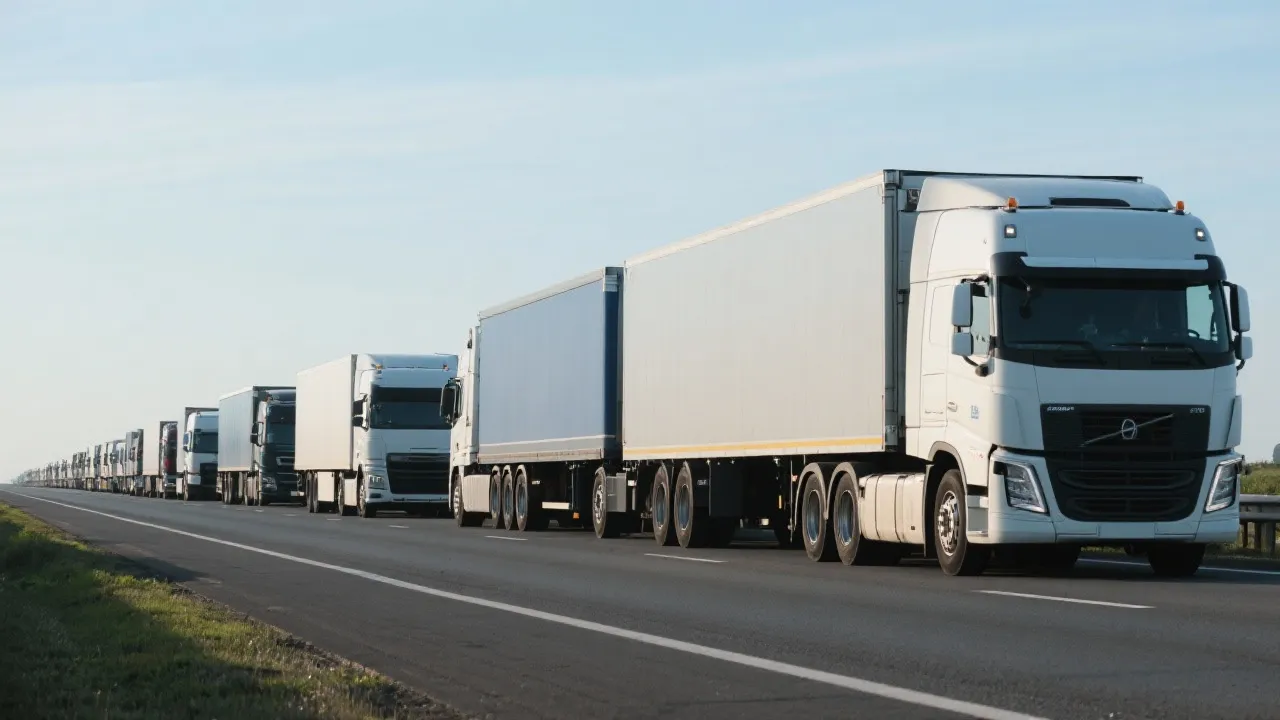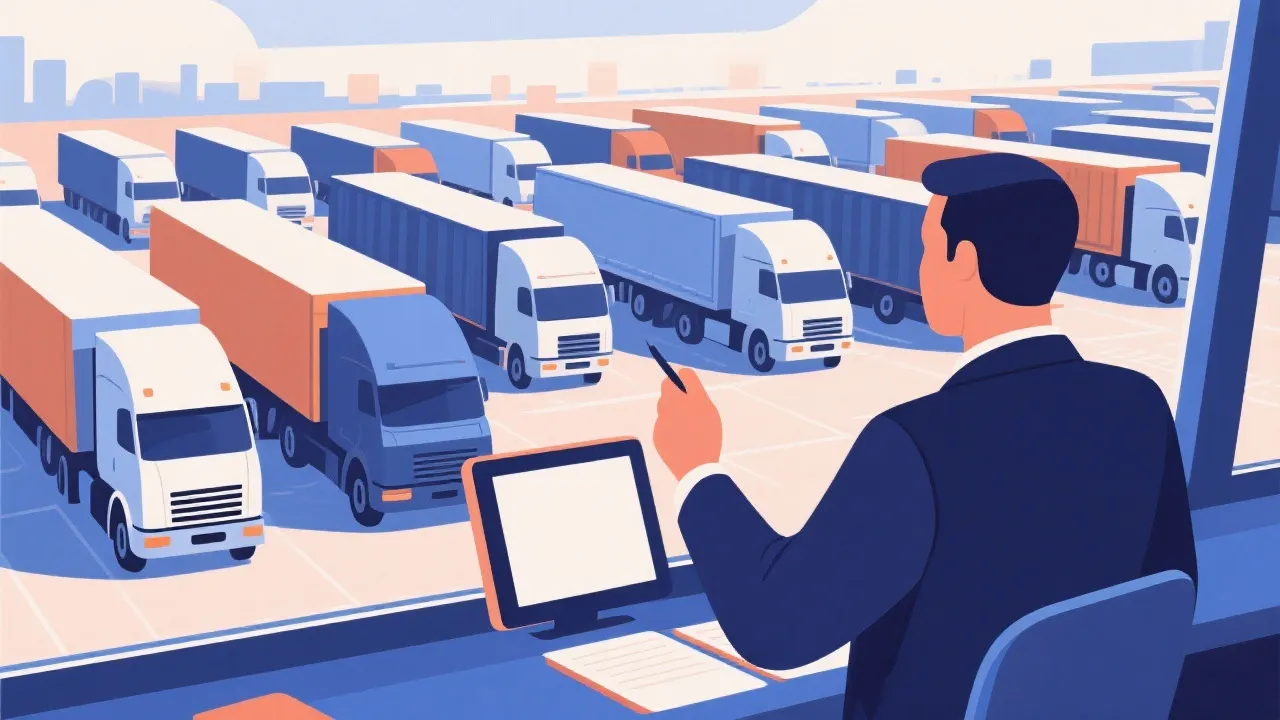This comprehensive guide delves into the trucking entrepreneur niche, exploring the landscape from setting up operations to optimizing logistics. As entrepreneurs dive into the trucking industry, they face unique challenges and opportunities across freight management, law compliance, and technological innovation. This article provides insights into successfully navigating this complex and dynamic field.
ADVERTISEMENT

Embarking on the journey of a trucking entrepreneur means diving into one of the very critical sectors of the economy. Trucking entrepreneurs play an essential role in facilitating goods movement across countries and supporting a wide array of industries from agriculture to technology. In this guide, we’ll explore the key components and strategies that are vital for success in the trucking industry.
The foundation of a successful trucking enterprise starts with meticulous planning and regulatory compliance. It begins with acquiring the necessary licenses and permits, such as the Motor Carrier Operating Authority and USDOT number, which are fundamental for operating in the United States. Gathering insights from industry reports and local logistics trends helps in creating a robust business plan that aligns with market demand.
When setting up a trucking business, it's also essential to choose the right business structure. Options include sole proprietorship, partnership, LLC (Limited Liability Company), or corporation. Each has its implications for liability, taxes, and operational complexity. Consulting with a legal expert can provide clarity on which structure aligns best with your business goals.
Another critical component is selecting the appropriate business model. Trucking businesses can operate in various niches, including but not limited to freight brokerage, long-haul transportation, or specialized hauling. Identifying your niche based on market research and personal expertise will help tailor your services to meet customer needs effectively.
Managing logistics efficiently is crucial for any trucking entrepreneur. This involves optimizing routes, managing fuel costs, and ensuring timely deliveries. Adopting digital solutions like telematics and GPS tracking can enhance fleet management capabilities. Analyzing routes for potential bottlenecks and leveraging tools for real-time tracking contribute significantly to improving operational efficiency.
Additionally, understanding cargo and shipping dynamics can further streamline operations. Entrepreneurs should familiarize themselves with various shipping methods such as full truckload (FTL) and less than truckload (LTL) shipping. Each has its benefits, and a solid understanding of when to utilize each can result in better pricing and service options for your clients.
Furthermore, the implementation of a robust warehouse management system (WMS) can complement logistics strategies. Effective inventory management ensures that goods are stored and retrieved promptly, enhancing delivery timelines and decreasing costs. As the volume of deliveries grows, investing in a WMS may lead to significant operational cost reductions and increased customer satisfaction.
Technology has become an indispensable component of modern trucking businesses. From automated booking systems to advanced telematics, incorporating technology can drastically reduce operational costs and enhance efficiency. Understanding the latest industry tech trends, such as electric trucks and autonomous driving features, can provide a competitive edge.
The integration of artificial intelligence (AI) and machine learning analytics can significantly improve decision-making processes within a trucking business. By analyzing vast amounts of data, these technologies enable entrepreneurs to identify inefficiencies, forecast demand patterns, and optimize routes even more effectively. Businesses that adopt AI-based solutions find themselves not only enhancing operational capabilities but also providing superior customer service through better delivery predictions.
In addition to AI, mobile applications designed for drivers and fleet managers can facilitate seamless communication and operational management on-the-go. Real-time updates on traffic, weather, or delivery status allow everyone involved to stay informed and make timely decisions, which is crucial in an industry where time is money.
Adhering to safety standards and regulatory requirements is paramount. The trucking industry is heavily regulated to ensure safety and environmental standards are met. This includes understanding Hours of Service (HOS) rules, weight limits, and emissions standards. Regular training programs for drivers about safety protocols and regulatory updates can mitigate risks and ensure compliance.
Incorporating safety technology such as collision avoidance systems and electronic stability control can significantly protect drivers and cargo. Moreover, proactive safety measures not only safeguard assets but can also lead to reduced insurance premiums, a critical aspect of financial management in trucking. Engaging with certified safety consultants can further help identify and resolve potential safety compliance issues before they escalate.
It is also essential to stay updated with changes in regulations that occur frequently. The Federal Motor Carrier Safety Administration (FMCSA) often makes amendments to safety rules and operational guidelines. Regular monitoring of these changes is vital for compliance and can prevent costly fines or penalties that can arise from non-compliance.
Trucking entrepreneurs must navigate through various challenges including fluctuating fuel prices, driver shortages, and intense competition. However, these challenges also present opportunities for innovation and growth. Strategic partnerships and investments in technology can help overcome hurdles and capitalize on market opportunities, like the growing demand for e-commerce and last-mile delivery services.
Additionally, the ongoing trend toward adopting green technologies presents a significant opportunity. As regulatory pressures around emissions grow, embracing the latest in eco-friendly transportation solutions can not only ensure compliance but enhance brand reputation among environmental consumers.
Another challenge worth recognizing is the evolution of customer expectations, particularly with the rise of online shopping. Beyond just deliveries, customers increasingly expect real-time updates and enhanced visibility into their shipments. To meet these demands, trucking entrepreneurs can invest in logistics platforms that integrate customer communication tools, providing clients with tracking capabilities and live updates.
Learning from the successes and failures of established trucking entrepreneurs can be highly beneficial. For instance, examining how certain companies have successfully scaled their operations through fleet expansion and driver retention strategies provides actionable insights. Looking into logistics innovation used by leading companies offers blueprints for adopting similar successful practices.
One notable example is the strategy adopted by some startups that focus on niche markets, such as refrigerated transport for pharmaceutical products. By specializing in this area and meeting stringent safety and quality standards, they have garnered a reputation as leaders in that segment, often charging a premium for their services.
Another case study focuses on the successful integration of technology by a medium-sized trucking firm, which adopted a fleet management software that provided comprehensive tracking and analysis of their operations. This led to an increase in efficiency by 30%, allowing them to take on more loads and ultimately increasing their revenue significantly. Such insights can inform new entrepreneurs on the importance of investing in technology.
Effective financial management is crucial for sustaining a trucking business. This involves budgeting for operational costs like fuel, maintenance, and salaries while also planning for unexpected expenses. Utilizing accounting software tailored for the trucking industry can aid in tracking expenses and managing cash flow efficiently.
In addition to budget monitoring, engaging in effective cost-saving strategies can yield considerable savings. For example, negotiating fuel contracts can secure lower rates, and implementing a maintenance schedule can reduce unexpected repair costs. Understanding when to outsource versus keep an operation in-house is also a vital financial decision that can affect the bottom line.
Additionally, exploring financing options is essential for growth. Many trucking entrepreneurs may require loans for purchasing new equipment or expanding their fleet. Researching various lending options and understanding their terms ahead of time can be beneficial. Working with a financial advisor experienced in the trucking industry may also provide valuable insights into managing cash flow or securing loans at favorable rates.
Furthermore, maintaining healthy relationships with shippers and customers can lead to more favorable contract terms. Regular communication about pricing changes and service revisions fosters trust and can culminate in loyalty, resulting in repeat business that proves cost-effective over time.
The path of a trucking entrepreneur is lined with challenges yet abundant with potential. By leveraging industry insights, embracing technology, and adhering to regulations, entrepreneurs can successfully operate and expand their trucking businesses. As the industry continues to evolve, staying informed and adaptable is key to thriving in this dynamic environment.
As you pursue your journey in trucking entrepreneurship, continually seeking knowledge about market trends, regulatory developments, and technological breakthroughs will keep your business positioned for success. Networking with industry peers, participating in trade shows, and engaging with think tanks can provide valuable insights that lead to innovation and competitive advantage. Remember, the essence of success in trucking is not just about moving goods; it is about building relationships, optimizing resources, and striving for excellence at every turn.
Engaging with community initiatives, such as driver appreciation events or environmental sustainability efforts, can also enhance your brand’s image and create goodwill in your operational areas. The trucking industry, when embraced with a forward-thinking approach and a commitment to excellence, can offer not just a profitable business but also a legacy of service and reliability.

Trucking entrepreneurship embodies the ambition to innovate within the logistics sector, playing a crucial role in transportation. By addressing logistics' dynamic nature and capitalizing on market trends, trucking entrepreneurs can significantly influence economic growth. This article provides insights and strategies for those considering or currently engaged in this lucrative field.

Trucking entrepreneurship is reshaping the logistics landscape, driven by innovation, technology, and new business models. This article delves into the dynamic world of trucking entrepreneurship, exploring the pivotal role it plays in global supply chains. It highlights essential strategies for aspiring entrepreneurs and analyzes current trends impacting the industry.

The journey of becoming a trucking entrepreneur involves not just owning a fleet, but mastering logistics, compliance, and market dynamics. Trucking entrepreneurship combines strategic investment in vehicles and technology with adept management to cater to the booming freight industry. As global trade expands, the prominence of trucking in logistics grows, presenting diverse opportunities for aspiring business leaders.

This article delves into the trucking entrepreneurship sector, offering insights into starting and managing a successful trucking business. With the transportation industry as a backbone of global commerce, trucking entrepreneurs play a pivotal role. Learn the key components of entrepreneurship in this field, including market analysis, fleet management, and navigating regulatory challenges.

Becoming a successful trucking entrepreneur involves navigating complex logistics, industry regulations, and evolving market demands. The trucking sector is an essential facet of global trade and commerce, transporting goods across vast distances. This article delves into key considerations and strategies for aspiring trucking entrepreneurs, empowering them to thrive in this competitive industry.

This guide explores the dynamic world of the trucking industry from the lens of a trucking entrepreneur. Understanding the burgeoning market allows entrepreneurs to navigate challenges and leverage opportunities effectively. This article delves into strategic insights, market trends, and operational tactics that aspiring trucking entrepreneurs should consider to drive their ventures to success.

The trucking industry is seeing a boom in independent ventures led by trucking entrepreneurs. These individuals are driving the sector forward by leveraging logistics expertise and innovative business strategies. With increasing demand for goods transportation, the opportunities for trucking entrepreneurs are vast, yet challenges like fluctuating fuel prices and regulatory changes persist.

This article delves into the world of trucking entrepreneurship, a burgeoning domain where business acumen meets logistics expertise. Trucking entrepreneurs play a crucial role in the supply chain, bridging manufacturers and markets. As logistics demands grow, these entrepreneurs are pivotal, offering job opportunities and contributing to economic growth while tackling industry challenges.